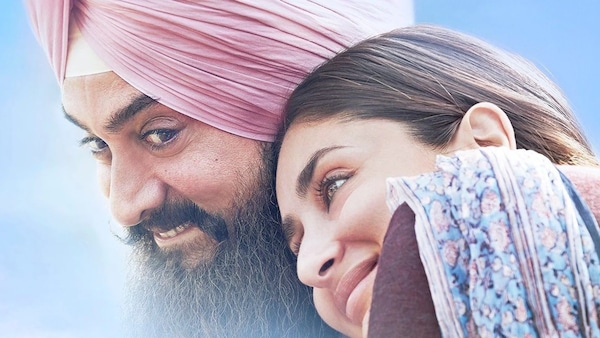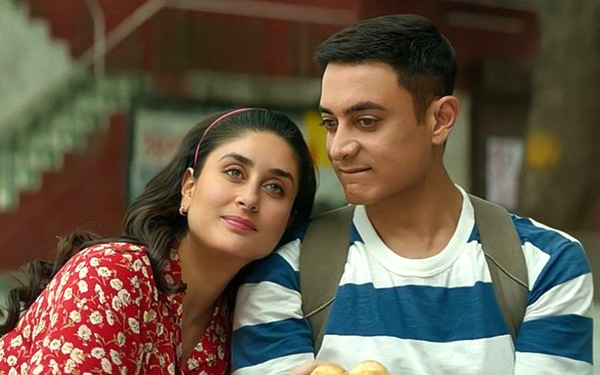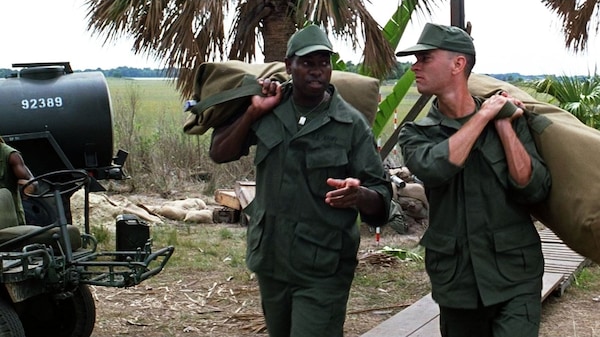Aamir Khan's Laal Singh Chaddha is an endearing film with an important lesson
Laal Singh Chaddha is both funny and moving. The Aamir Khan-starrer also makes pretty good use of its lengthy run time, rarely deviating from its main message.

Last Updated: 03.41 PM, Aug 14, 2022
Laal Singh Chaddha is an official remake of the Oscar-winning American drama Forrest Gump (1994) based on Winston Groom’s 1986 novel of the same name. From the perspective of Laal Singh Chadha (Aamir Khan), an autistic man with a wide range of emotions, the film narrates the major events of Indian history, including the victorious 1983 Cricket World Cup, the Rath Yatra, the Emergency, Operation Blue Star, and the 1999 Kargil War.
Laal Singh Chaddha, like its original, depicts a simple man gliding through life with goodwill and values. The story opens with the song Kahani, which is played against a rural landscape while a bird's feather travels through various locations and lands at the feet of the titular character. Laal discusses life, personal tragedies, and romantic dreams with his co-passengers.
Something is interesting about Aamir Khan's stardom. He takes his time making movies, and when he finally finishes and releases one, the entire nation pays attention. The same thing happens on screen! When the innocent Laal speaks or rather jabbers, with awkward pauses, folks pay attention. Aamir appears caricaturish, as he did in PK, but that’s all right.

Laal Singh Chaddha appears to hold the audience's attention, which is uncommon in today's Bollywood films. The script was written by Atul Kulkarni, who worked with Aamir in Rang De Basanti. Several scenes, including the Kargil ones, have a strong emotional impact on the viewer. In dialogue-driven scenes, the actor's signature brilliance is missing, but he compensates with eye movements. When Aamir is trying to figure out what is going on around him, his wide-eyed expression seems almost poetic in its stillness.
Mona is excellent. She is a strong single mother and farmer who drives a tractor through town and believes that Laal, who is allegedly unequal, deserves every opportunity available. Naga Chaitanya is a natural fit for the role of Bubba in Forrest Gump. Bala becomes Bubba; Aamir Kargil's War partner, with whom he co-founds a clothing company.

Laal Singh Chaddha should connect with audiences, who must watch it regardless of what the trolls say, and if it does, it will finally put an end to Bollywood’s creative drought. For a film centred on contemporary history, the production design doesn't somehow stand out as much as it should. Parts of Pritam's music are enjoyable. Phir Na Aisi Raat Aayegi is possibly the best song on the album. Arijit Singh's voice adds weight to the track, which grows in resilience over time.
Laal starts running at a critical juncture. And he keeps going. He has been running for months. People notice him and wonder why he runs as time passes. He is joined by other runners. He comes to an abrupt halt one day. "I'm tired," he admits. Everyone is taken aback by this. He returns with ease; like it's over.
He adopts Rupa's mantra of "Run, Laal, Run." It's what drives him to remove his metal skeletal shackles after doctors had given up hope on his ability to walk without assistance. It's also what gets him noticed as a top athlete by accident.

Laal Singh Chaddha outdoes Forrest Gump by fleshing out Rupa's character with brief but significant details from her past. The film is both funny and touching, thanks to excellent acting and chemistry between its main characters. The Aamir Khan-starrer makes excellent use of its lengthy runtime, rarely deviating from its main message and engaging story.
It's fascinating to see how Rupa inspires Laal and supports him in discovering and making peace with his identity in a nation that was initially vitriolic to him. Although the female lead is not completely liable for the hero's transformation, she functions as a catalyst. I like how her role in the story isn't to serve the male protagonist. Rupa had dreams and hopes. She is self-reliant.
Rupa's aversion to marriage stretches back to her childhood when her father was responsible for her mother’s death. Despite having Laal by her side, Rupa woos wealthy men in college. And, later, she finds herself in the same situation she was hoping to avoid all along: her gangster partner physically abuses her.
A nation's innocence melts away, but a child-like man clings to his own. Laal's mother calls him every time there is a communal clash in India, and instead of explaining the complicated reality, she tells him to stay inside because "malaria" is spreading outside. Despite the political subtexts, the story is safe and apolitical as seen through the innocent Chaddha's eyes. Laal and Rupa's gentle emotions make you wish the flashback would never end. Ahmad Ibn Umar's performance as the young Laal is remarkable.
There isn't an overtly negative character in the original. The principal at Gump's elementary school and Lieutenant Dan of the United States Army are two negative ones. However, the leader of the infiltrators at Kargil had to be a Muslim. Laal saves his life, and he returns to Pakistan a changed man. This is an awful stereotype! Why should he be a Muslim? As if the idea of terrorism was inspired by Islam, and the religion propagates all wrong things?
The only thing that doesn't work is the de-ageing technique. It's difficult to buy Aamir Khan as an undergraduate student. The same goes for Shah Rukh Khan.
After watching this film, one wants to say, as Aamir does after eating his yummy golgappas, “The stomach is full, but the heart wants more!”

